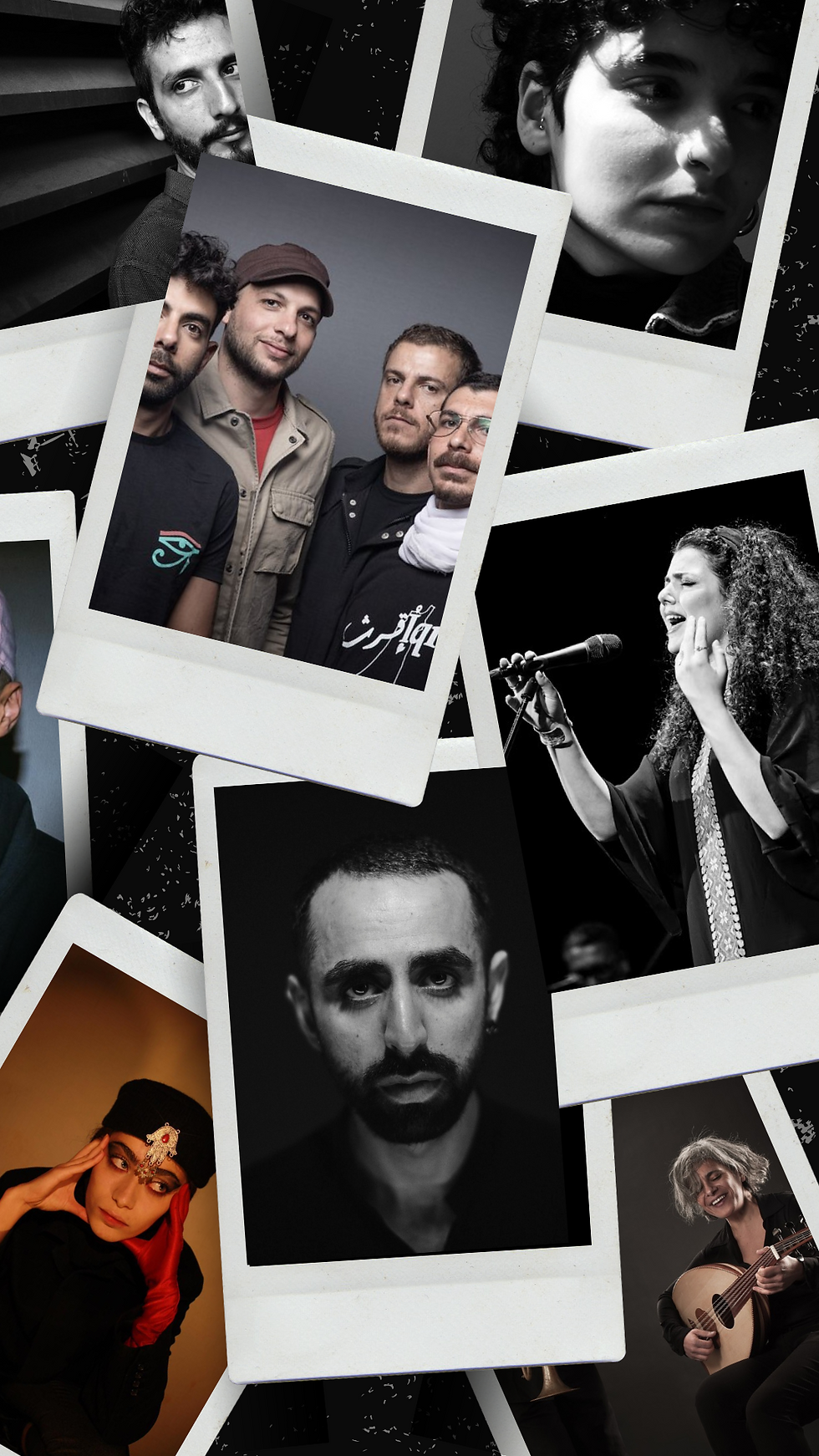
As the world grows more attuned to the vibrant cultural identity of Palestine, its music scene is garnering well-deserved global attention. Palestinian artists are infusing traditional sounds with contemporary influences, creating music that both preserves and modernizes their heritage. Their work is not only a celebration of Palestinian culture but also an homage to resilience, expressing the nuances of the Palestinian struggle through creative, innovative lenses. Here are some Palestinian music artists to follow before the year ends, each bringing something unique to the stage.
BINT7ALAL
Bint7alal, a rapper and producer now based in London, emerged from a complex background to launch her music career in 2020. Her sound is defined by her distinct voice, often altered with auto-tune to create a more-than-human effect, conveying a raw intensity that mirrors her life experiences. The Palestinian artist is currently working on a new record, set to feature collaborations with leading figures in the Arab music scene, including Julmud, Al Nather, and Onsy.
47 Soul
47 Soul, a Palestinian-Jordanian electro-mijwez, shamstep, and choubi band, is widely credited with pioneering the shamstep genre. Their music blends the traditional rhythms of Dabke, a Levantine folk dance, with modern Western electronic beats, creating a unique and dynamic sound that bridges cultures. The group’s groundbreaking 2015 debut EP, *Shamstep*, introduced this genre to a global audience, combining hypnotic synths, driving beats, and the distinctive sound of the mijwez (a traditional reed instrument). This fusion of heritage and contemporary music has earned 47 Soul a devoted following, making them a trailblazer in the Arab music scene.
DAM

pioneering Palestinian hip hop band DAM has been making waves since the early 2000s. Originating from the city of Lod, the original lineup—Tamer Nafar, Suheil Nafar, and Mahmood Jrere—used their music to spotlight the struggles faced by Palestinian citizens of Israel, addressing issues such as poverty, racism, and discrimination. One of their early breakthrough songs, Meen Erhabi (Who’s the Terrorist?), powerfully confronts these challenges, with lyrics like “Who’s the terrorist? I’m the terrorist? How am I the terrorist when you’ve taken my land?” encapsulating the frustrations and resilience of the Palestinian people.
Nai Barghouti
Singer, composer, and ney player Nai Barghouti remains deeply rooted in the traditional Arabic modal system, showcasing a profound connection to her musical heritage. Despite her young age, Barghouti has built an impressive career, including a UK tour in 2017. Her compositions for the ney have been recognized internationally, becoming part of the flute curriculum at the International Institute of Iberian Music in Valencia. Barghouti has also been exploring the fascinating intersection between Tarab, the art of classical Arabic singing, and jazz during her studies at the Conservatorium van Amsterdam.
Rasha Nahas
Avant-garde artist Rasha Nahas brings a unique blend of theatricality to her music, drawing on elements of pop, indie rock, jazz, rockabilly, surrealism, punk, and spoken word. The Palestinian guitarist, singer, and composer has captivated audiences with her distinctive style. She has recently released her highly anticipated debut album, *Desert*, showcasing her ability to seamlessly fuse diverse genres while maintaining an evocative and experimental sound.
Bashar Murad
Bashar Murad (Arabic: بشار مراد; born February 7, 1993) is a Palestinian singer-songwriter and video artist based in East Jerusalem. His music boldly tackles societal norms, the Israeli occupation, and issues of gender equality in the Middle East. Murad gained widespread recognition through his collaboration with Icelandic techno-punk band Hatari on the song "Klefi / Samed," which was released shortly after Hatari raised Palestinian flags during the Eurovision Song Contest 2019 final in Tel Aviv. In June 2021, Murad released his debut EP *Maskhara*, further cementing his place as a powerful voice in the region's music scene.
Kamilya Jubran
Kamilya Jubran is a renowned Palestinian vocalist and oud player, with a musical career spanning over four decades. She first gained recognition in the 1980s as part of the Jerusalem-based music collective Sabreen, playing a pivotal role in shaping the Palestinian cultural landscape. Jubran's work blends traditional folkloric music with contemporary and experimental-electronic elements, creating a sound that delves deeply into themes of identity, place, and the Palestinian experience. Her artistry has made her a powerful voice in both the Palestinian and international music scenes.
Faraj Suleiman
Acclaimed jazz pianist and composer Faraj Suleiman is known for infusing his compositions with tango-inspired rhythms, creating a distinctive blend of jazz and Middle Eastern influences. In addition to his solo work, Suleiman composes music for theatre and has collaborated with renowned graffiti artist Banksy on a project for the Walled-off Hotel in Bethlehem, Palestine. His ability to merge different musical styles has earned him recognition on both local and international stages.
Ya Hu

Ya Hu, a DJ hailing from Ramallah-Jerusalem, is known for blending industrial sounds, techno, and experimental Arabic melodies into her dynamic sets. As a member of the UNION Collective, she has been instrumental in organizing unforgettable nights in Ramallah and expanding the collective's influence to iconic venues like Phonox, Fabric, and Katerblau. Beyond the decks, Ya Hu is also the co-founder of FANA’ Collective, a platform aimed at deconstructing conventional knowledge and art production, creating spaces for alternative artistic expression and community engagement. Her work has helped push the boundaries of Palestinian electronic music.
Follow us on:
Make sure to share this post and subscribe to our newsletter to receive notifications on our latest posts, as well as exclusive content and much more!

コメント